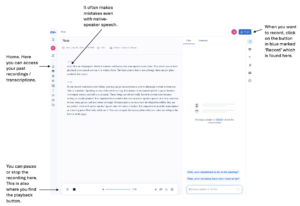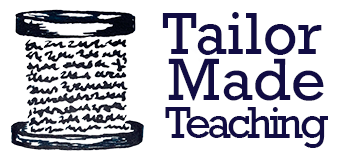
What is Otter.ai?
Otter.ai is an AI programme which records and transcribes your speech in real time. This allows you to both play back your speech and see it in written form. The basic plan is free to use, although there are Pro plans available for a price.
Understanding the Limitations
Speech v. Writing
If you haven’t read tapescripts before, you may judge a transcription as you would judge a normal written text. This is a mistake. Speaking is very different to writing. It is normal in unplanned speech to pause, hesitate and ‘repair’ (correct yourself as you speak). These things are not normally found in written texts because writing is usually planned. It is important to remember that, even in native-speaker speech, it is very common to hear some pauses and hesitations.
AI Transcription
Although AI transcription services are incredible, they are not perfect. Even with native-speaker speech Otter.ai makes mistakes. It is important to treat the transcription as a starting point, don’t rely solely on it. You can compare the transcription with your voice recording at the bottom of the page. You can also edit the transcription after recording to correct mistakes.
Different accents, dialects and uncommon phrases may cause problems for Otter.ai. Don’t let occasional inaccuracies discourage you, they can provide an opportunity to fine-tune your listening skills.
AI is evolving all the time so we can expect the service to improve.

A transcription of this post using Otter.ai
How to use Otter.ai
You can use Otter.ai just as you would use any recording device. I have suggested several exercises here.
Transcription can be particularly useful for pronunciation practice for specific words. If there are repeated mistakes transcribing particular words, it is quite likely the problem is pronunciation.
You can count your pauses, hesitations and ‘repairs’ and work on minimising them. This will aid your fluency. Remember, some hesitation and pausing is natural but if you are excessively pausing, you can practice the same task repeatedly until you are speaking more fluently
Track Your Progress
Keep a record (spoken or typed) of your past recordings and periodically review them to decide what you need to focus on in future practice and appreciate how far you’ve come.
Let me know how it goes.


